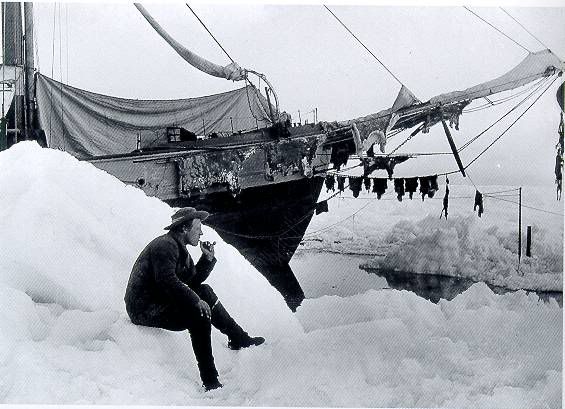As an aside, the Fram museum in Oslo is wonderful, you get to crawl around the ship and it’s full of mementos and artefacts from the expeditions by Nansen and Amundsen. In some ways, the Fram is the embodiment of the whole golden age of polar exploration, getting to farthest north, surviving the ice pack, then later carrying Amundsen to the brink of the South Pole, where he beat Captain Scott in that legendary race. So it was a real privilege to climb aboard!
http://www.fram.museum.no/en/default.asp?page=90
There’s a picture of me at the wheel (or whatever mariners call it!) somewhere, grinning like a twonk, which I’ll dig out at some stage.
But for now…

Review: Nansen, Roland Huntford.
Having been to Oslo and visited the Fram, the ship almost as famous as those great explorers who sailed in her, Nansen and Amundsen, I wanted to finally get to grips with this weighty tome which has sat on my shelf gathering dust for a few years.
Huntford presents a brilliantly researched book building up a character profile with little need to make broad judgements as to Nansen the man. Conjecture is kept to a minimum in light of journal entries and letters supporting the conclusions made where fact is perhaps ambiguous.
To say Nansen was complicated was an understatement. I felt a deep sense of sadness when reading about him. An academic, an intellectual, a visionary genius, yet a true man of action in the Viking tradition of hardy adventure, he was able to adapt the polar experience of indigenous peoples, be they Sami or Inuit, without any western arrogance. He was ahead of his time.
Compassionate on a broad level, dedicated to the survival and health of his men, yet unable to relate to people at an individual level, he must have been extremely confusing for those closest to him. Be they his colleagues out on the ice or his loved ones back home. Letters and diary entries from those that explored with him were filled with anger about his mood swings and occasional arrogance. Following his first crossing of Greenland, he commissioned the building of the Fram, a tough ship customised to handle the intense pressure of polar ice.
After leaving the Fram embedded in ice, he struck out with Johanssen for the pole. After getting "Farthest North" but sensibly not overextending themselves in trying to reach the pole itself, they suffered together, eventually reaching Franz Josef land where they overwintered, sharing a sleeping bag together for months, through dark polar winter. Nansen was unselfish and truly democratic in the necessities of survival and yet it didn't seem he forged any great friendship. Loyal he was to a degree (sometimes apparent in later life when he intervened to get his former comrade work or send him loans) yet it was all arms length. And it was a tragedy that Nansen couldn't face the funerals of those closest to him as they slowly fell around him as he got older. Huntford captures this well, the inner turmoil of the man so emotive in his letters and diary and the cold outward exterior becoming of a statesman. He wanted the best for people, but even his own children found him oppressive and perhaps unloving (unless they were skiing). The relationship with his wife Eva comes to life through extracts of letters and telegrams. There is a sweet innocence about their love for each other, but he couldn’t communicate with her when he was with her, away in reveries or research, or in the confidence of other women.
It's awesome fast paced stuff, but fizzles out a bit.
He seemed continuously searching for purpose in his later life and it seemed a recurring theme was he only came to life, when talking about his exploits on the ice.
I feel the weakest chapters relate to the work around the soviet union, famine relief and the population exchanges between Greece and Turkey after the first world war. The complexities around the politics were briefly covered (even this was hard going) but some subtlety seemed to have been missed. All soviet officials and leaders seemed to be fundamentally flawed for instance, ogres or effeminate conniving bullies but this is probably unfair in light the book would needed to have been twice the length to capture all the subtleties needed.
All in all, a great read about the father of modern polar exploration.
No comments:
Post a Comment